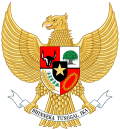| Kementerian Pemberdayaan Perempuan dan Perlindungan Anak | |
 Logo of the Ministry of Women Empowerment and Child Protection | |
 | |
 Flag of the Ministry of Women Empowerment and Child Protection | |
| Ministry overview | |
|---|---|
| Formed | 1978 |
| Jurisdiction | Government of Indonesia |
| Headquarters | Jalan Medan Merdeka Barat No. 15 Jakarta Pusat 10110 Jakarta, Indonesia |
| Minister responsible |
|
| Deputy Minister responsible |
|
| Website | www |
The Ministry of Women Empowerment and Child Protection (MoWECP) (Indonesian: Kementerian Pemberdayaan Perempuan dan Perlindungan Anak, abbreviated Kemen PPPA) of the Republic of Indonesia, formerly the Ministry of Women's Empowerment of the Republic of Indonesia, is a government ministry responsible for the rights and welfare of women and children of Indonesia. Since 21 October 2024, Arifah Choiri Fauzi has headed the ministry.
